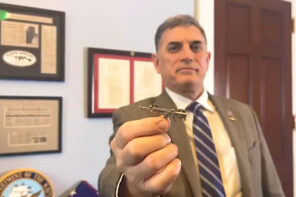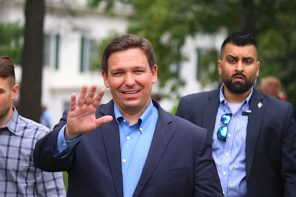Gary Laderman’s piece, The Economy is Sacred, Stupid, on the essential religiosity of most Americans’ commitment to a free market economy, captures the essence of what his scholarship has done so creatively over many years. It takes the form of a brilliant thought-experiment: what happens if we shift from the language of religion, or faith, to the language of sacrality and the sacred? What happens, he contends, is that we suddenly notice the spiritual dimension of cultural values and experiences we were likely to miss otherwise.
So it is here: what happens if we view the Market as sacred space—Adam Smith’s “Invisible Hand” and all?
I would like to supplement Laderman’s keen observations by playing out a further implication of his thought experiment: what if there is an implicit theology to this distinctively American “religion of the marketplace”? An especially fruitful approach to precisely this question was voiced by James Buchan in his extraordinary 1997 book, Frozen Desire:
In the new world, first, there is no such thing as Providence, merely probability, which can be studied at the gaming table. Second, there is such a thing as usury: whatever Aristotle and the Gospels say, money is productive of more money, it does breed, and on Sunday, too… Third, the Church is quite wrong and human beings are all more or less alike. Reality is thus reconfigured on the basis not of an immortal soul and a benign providence, but of probability and compound interest, which become, essentially, the theology of modernity.
For Buchan, then, the American-style theology of the marketplace has three essential components.
First, Providence is trumped by the gambler’s probability, a kind of numerical reasoning that you can indeed calculate, as you could never calculate the economics of grace. Think of that: grace, the paradigmatic free gift, is replaced by the massive edifice of Wall Street number-crunchers and their continual wagering on the future probabilities.
As we all know, a lot of money has been made—and lost—this way.
Which leads Buchan to his second point: money generates more money, even on Sunday. This is a subtler point, one that he develops specifically in relation to the invention of paper money—money, that is to say, with absolutely nothing to back it up. What paper money did, in Buchan’s view, was to sever once and for all the relationship between money and “real value.” Now, money has strictly symbolic value. It is less like an image, depicting a likeness of value, and more like an icon, possessing a presence and a generative aura. This is the world, not just of capital and credit, but of the credit card. Money generates more money, quite literally. In times of real crisis, the presses at the Treasury Department may never stop turning.
And this leads to Buchan’s third point: the essential equality of access the capitalist system presupposes, one that is ironically at odds with the essentially hierarchical cosmology of traditional, pre-modern Christian theology, with its Dante-esque tiers of Heaven, Hell and Purgatory. To be sure, the vast majority of the world’s souls were destined for Purgatory, where waiting is the primary task and patience the primary virtue. That helps to show why Buchan thinks the theology of the marketplace is so heterodox and so revolutionary: there is nothing patient about it. It demands what Max Weber famously called this-worldly salvation: the frenetic pace of trade and development; quick turnarounds; instant returns on calculated risks.
It’s part of the myth (yes, myth) of Horatio Alger: everyone is just one lottery ticket (or one investment, which amounts to much the same thing) away from becoming a millionaire.
What is most striking about Laderman’s suggestion is that it helps us to see why the economic crisis is so shattering, and why the accountants are monitoring the returns so closely… Black Friday, Bruised Saturday, Cyber Monday.
In short, if James Buchan is right and there is an implicit theology to this marketplace, then what we experienced in 2007 and 2008—and what we are still experiencing now—is the problem of theodicy. Communism, in short, is not the only “god that failed.”
Who today can maintain the simplistic faith of our forefathers? Not in probability; the market simply refuses to behave in predictable ways these days (which may put a lot of so-called experts out of a job ere long). Not in money’s limitless potential for generative power; it doesn’t automatically generate more of itself, and we can’t just keep printing more of it forever. And not in radical equality, nor in the limitless upward mobility provided to anyone who works for it. If Bernie Madoff taught us anything, he provided abundant insight into what the world of elite privilege looks like, and just how rigged the game really is. Corners could be cut, rich portfolios could be manufactured out of thin air, and rules could be bent, broken, or ignored, all in order to helps one’s own.
So we really are living in a moment of market theodicy, ripe with the potential to create some surprising new spiritual alignments. The old mainline market theology may yet be seen for what it is: a heresy. In this new world, the belligerently pro-business wing of the Republican Party—with its unwavering commitment to free markets, deregulation, extended tax cuts, and an image of America as a providential city on a very wealthy hill—suddenly appears more clearly in its true light.
They are the Gnostics, the elite heretics, whereas the Social Democrats are ironically true heirs to an orthodox gospel of compassionate care for the least among us. And in the egregiously hierarchical world of high finance, it turns out that the least among us form a stunning, and long-suffering, majority.




